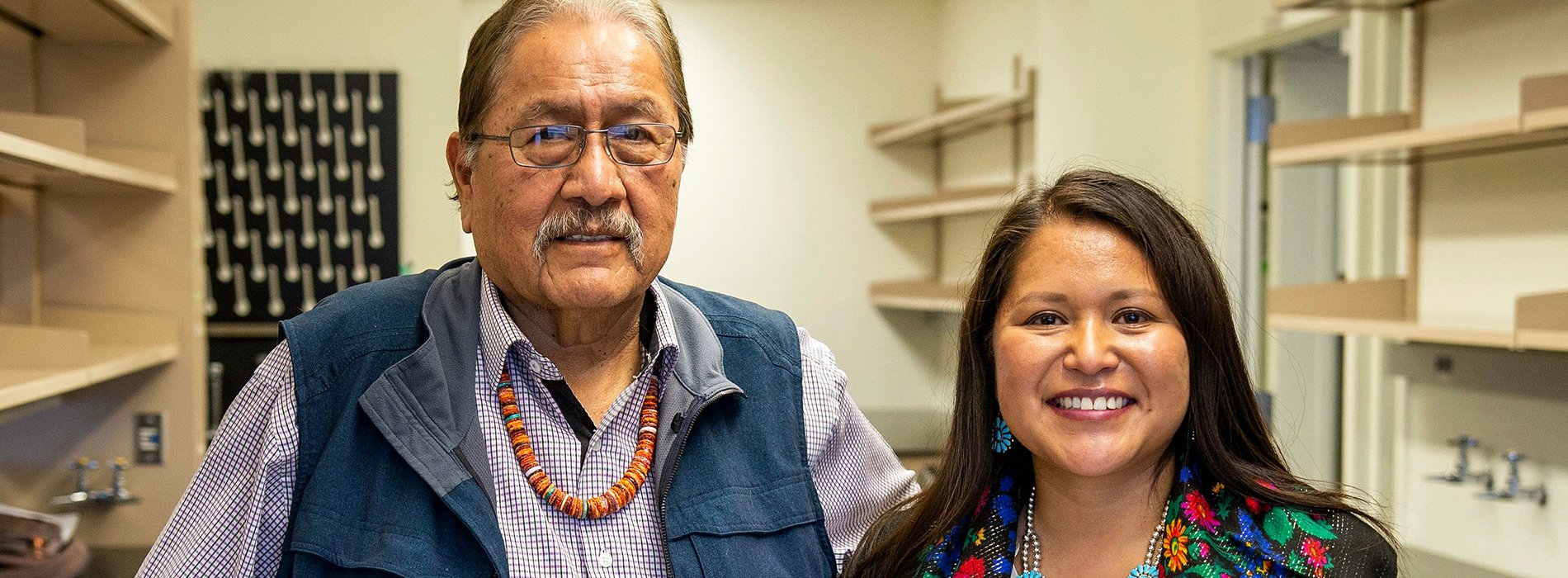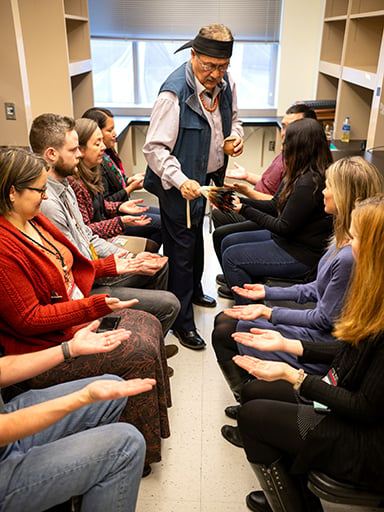Perhaps the future of modern, transformative medicine begins with a bridge to the past.
“Our genes are as old as the universe – everything that proceeded us is now. In Navajo culture, the past is the now,” said Diné (Navajo) traditional healer David Begay, PhD.
Begay, an associate professor from the University of New Mexico, was recently invited to the University of Colorado Anschutz Medical Campus by Katrina Claw, PhD, a Diné (Navajo) geneticist, to lead a Native American ceremony for Claw’s new genomics lab in the Division of Biomedical Informatics and Personalized Medicine.
|
|
|
David Begay, PhD, begins the Native American ceremony with special guest participants. |
Claw’s lab focuses on pharmacogenetic variation and uses precision medicine and omics technologies to unlock complex interactions between genes and health and disease. She strives to use this knowledge to address disparities, especially in access to genomic medicine in populations historically underrepresented in health research, such as Native Americans and indigenous peoples.
Traditional cleansing and blessing
For many Native American tribes, a cleansing and blessing ceremony takes place before one moves into a new space. As a Navajo scientist, Claw wanted to ensure she started on the right path forward with integrating indigenous culture to show respect for the people with whom she ultimately aims to collaborate.
In genomics and health research, there remains a lot of mistrust of researchers and institutions by indigenous people because of historical harms, including unethical research, loss of land and culture, and inequities in health. When working with indigenous populations, it has become a moral imperative to take into consideration the ethical, legal and social implications (ELSI) of genomic research and how community engagement plays a role in research.
“In my conversations with my community partners and stakeholders, it has become apparent that cultural knowledge and values need to become an integral part of the research process in order for trust and transparency to grow with indigenous communities,” said Claw, who also works in partnership with American Indian and Alaska Native tribes across the United States, including the Native BioData Consortium.
Indigenous populations affected
“It was clear to me that as I moved into this new research space that will store and care for biospecimens (e.g, human cells, blood and DNA) from my indigenous partners, an appropriate ceremony was needed before any research proceeded,” said Claw.
In her most recent work at the University of Washington and with the Northwest Alaska Pharmacogenomics Research Network, she sought to identify and functionally characterize variation in genes related to metabolism of vitamin D and nicotine. While vitamin D deficiency and smoking prevalence are widely known public health concerns, it is particularly problematic for some indigenous populations that have limited sun exposure and altered diets or who have high prevalence of smoking. Claw will continue this work at CU Anschutz.
During the Native American ceremony in the Research 2 Building, Begay walked the aisles of the lab to cleanse the space of previous occupants and any negativity associated, using traditional herbs and sacred items.
Following the cleansing, Begay performed a blessing coupled with an ancient Native American song within the boundaries of the space to ensure that not only Claw and future researchers in the lab are protected, but also to ensure that the biospecimens that will soon be stored there are protected.

David Begay, PhD, and Katrina Claw, PhD
Helping large populations
Special guests who participated during the ceremony included Kathleen Barnes, PhD, head of the Division of Biomedical Informatics and Personalized Medicine (BIPM) and director of the Colorado Center for Personalized Medicine (CCPM); Ivana Yang, PhD, and Colleen Julian, PhD, faculty from BIPM/CCPM; Krystal Tsosie, MPH, MA, Diné (Navajo) geneticist at Vanderbilt University and the Native BioData Consortium; and Joseph Yracheta, MS, P'urhépecha (Tarascan) and Raramuri (Tarahumara), vice president of the Native BioData Consortium.
Missing from the ceremony was the traditional sage smudging ritual, which was deemed too precarious in a lab full of smoke detectors. Following the ceremony, looking around at Claw’s lab – with its currently empty shelves and bare countertops that will soon be put to full use – Begay closed the ceremony by connecting the past to the promise of the future.
“As far as genetics are concerned, Native people knew all about genes and what kinds of diseases you are more likely to get – they knew about it. Now, the work of Katrina and this lab will create good research and data to serve a really good purpose,” said Begay. “This work can save a lot of people who suffer from diseases.”
Photo at top: In Katrina Claw's lab space are, from left to right, Krystal Tsosie, Claw, Joseph Yracheta and David Begay. All photos by Daniel J. Sauve.
Guest contributor: Holli Keyser, communications program manager, Department of Medicine.


.png)
.jpg)
